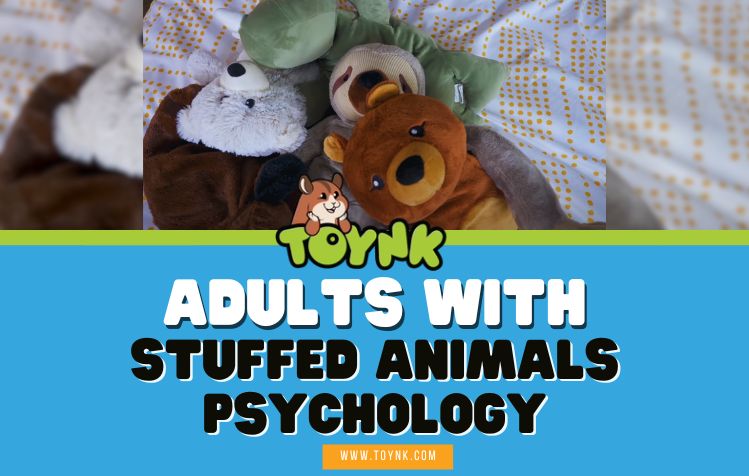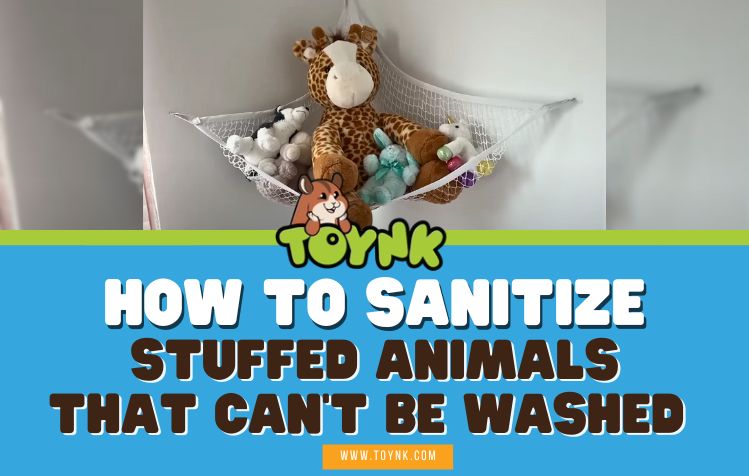While stuffed animals are often associated with childhood, recent research reveals that approximately 43% of adults still own plush toys from their youth. This growing trend has sparked interest in the psychological benefits behind adult attachments to stuffed animals.
This intriguing aspect of human behavior raises thought-provoking questions about attachment, comfort, and the inner workings of the human psyche as we navigate an increasingly stressful world in adulthood.
Here's what psychology says about adults with stuffed animals — and why it's completely normal.
SHOP THE PLUSH TOYS COLLECTION NOW
What Psychology Says About Adults With Stuffed Animals

Psychologists find nothing concerning about adults owning stuffed animals. Research indicates that adults who connect with childhood stuffed animals often experience significant comfort and emotional regulation benefits.
Teddy bears and stuffed animals are transitional objects during childhood that help children move from dependence to independence. These comfort objects are frequently used at night when a child sleeps alone, easing separation anxiety.
Clinical psychologist and pediatrician Donald Winnicott coined the term "transitional object" to describe these comfort items that help manage separation anxiety and reduce feelings of isolation. While Winnicott initially focused on children, modern psychology recognizes that these transitional objects can also serve valuable purposes throughout adult life [1].
Why It Isn't Weird
You're in good company if you're an adult with an attachment to plush toys. Research shows that approximately one in five adults — about 20% — experience anxiety disorders, which often contribute to sleep difficulties.
The Build-A-Bear Workshop and Atomik Research survey revealed that 40% of adults continue to sleep with a stuffed animal, with millennials representing a significant portion of this group. Many adults find that stuffed animals help improve their mental health and provide emotional support.
Even more surprising, among the 43% of respondents who admitted to keeping stuffed animals, 84% were men compared to 77% of women, challenging stereotypes about who maintains these comforting connections.
8 Benefits Of Stuffed Animals For Adults
1. To Find Comfort

Because our plush companions provided comfort during childhood, our brains are neurologically wired to recognize them as security sources even into adulthood. The tactile sensation of hugging a stuffed animal triggers the parasympathetic nervous system, reducing heart rate and blood pressure, similar to weighted blankets.
Recent neurobiological studies show that physical contact with stuffed animals can help activate regions in the brain involved in emotional processing, dampen the body's stress responses, and provide comfort.
2. To Sleep Better
Sleep quality affects every aspect of our health, from cognitive function to immune response. For many adults, stuffed animals are bedtime aids that can reduce anxiety and promote better sleep and faster sleep onset.
Sometimes, sleeping with stuffed animals is simply about comfort and familiarity, much like having a favorite pillow. For others, these plush companions become essential parts of sleep hygiene routines that signal the body to rest.
Whatever helps you sleep faster benefits your overall health, as long as it doesn't involve substances that interfere with natural sleep cycles. But is it weird to sleep with stuffed animals?
3. To Improve Mental Health

Mental health professionals increasingly recognize the value of stuffed animals for certain conditions. Dr. Aniko Dunn, a licensed psychologist, recommends plush companions for people managing bipolar disorder, PTSD, and other mental health conditions.
A 2024 study found that adults who engaged in daily 20-minute sessions holding a favorite stuffed animal showed a 40% reduction in nighttime hypervigilance and a 31% improvement in sleep quality, particularly beneficial for those with trauma histories who need to self-soothe.
SHOP THE PLUSH TOYS COLLECTION NOW
4. TO HELP EASE LONELINESS
As social creatures, humans seek connection, and in an increasingly isolated world, stuffed animals can help bridge emotional gaps. The pandemic highlighted the profound impact of isolation, with many adults turning to plush companions during lockdowns.
While stuffed animals can't replace human interaction, they provide tactile comfort that activates many of the same neurological pathways as interpersonal touch. For those living alone or managing grief, this sensory experience can be particularly valuable for maintaining well-being.
Here's a list of the best stuffed animals for anxiety.
5. To Have Security

Major life transitions — like moving for college, starting a new job, or ending a relationship — can trigger feelings of insecurity. A familiar stuffed animal provides a sense of security during these changes.
Neuroscience research reveals that the emotional security provided by transitional objects helps moderate the brain's stress hormones. This explains why even highly successful adults might keep their stuffed teddy during significant life changes, helping to maintain resilience.
6. To Help Heal From Trauma
Stuffed animals can play a meaningful role in trauma recovery and therapeutic processes. Mental health professionals sometimes incorporate cuddly companions into "re-parenting" techniques, where trauma survivors use stuffed animals to process and heal from adverse childhood experiences.
By unconditionally caring for a stuffed animal, individuals can develop nurturing behaviors that eventually extend to self-compassion. This process creates a safe space for expressing emotions and rebuilding self-esteem that may have been damaged by past experiences, promoting a sense of calm.
7. To Remind Them Of Childhood

A 2024 qualitative study found that 82% of adults who kept childhood stuffed animals associated them with specific childhood memories, with the majority reporting that cuddling with a stuffed animal triggered vivid recollections of positive experiences.
This nostalgia connection isn't just sentimental — research shows that nostalgia can reduce stress, increase feelings of social connectedness, and even boost immune function. Your teddy bear might improve your physical and emotional well-being through these memory associations, offering comfort and well-being.
8. To Reduce Stress
The physiological benefits of interacting with stuffed animals are well-documented. Physical contact with plush toys can lower cortisol levels, your body's primary stress hormone.
High cortisol is linked to numerous health issues, including weight gain, cardiovascular disease, and compromised immune function. Cuddling a stuffed animal activates the body's release of oxytocin, counteracting stress responses and promoting calm and relaxation.
Is There A Stigma On Having A Stuffed Animal?

While some stigma persists, social attitudes are rapidly evolving. Social media platforms have normalized adult plushie ownership through trends like #PlushieParenting, where users demonstrate self-care practices involving stuffies.
Mental health advocates have rebranded plush companions as tools for emotional intelligence rather than signs of immaturity. A 2025 analysis of social media content found that 68% of posts framed adult use of stuffed animals as evidence of emotional awareness and self-care rather than childlike behavior.
However, it's important to maintain perspective about your relationship with stuffed animals. Mental health professionals suggest watching for these potential warning signs:
- Avoiding travel or social events specifically because you can't bring your stuffed animal
- Consistently prioritizing interactions with soft and huggable toys over human relationships
- Requiring elaborate rituals involving your stuffed animal that interfere with daily functioning
These behaviors might indicate that your attachment has moved beyond helpful comfort into potential dependency.
Comfort in Cuddles: Growing Trends
The acceptance of adult stuffed animal ownership reflects broader cultural shifts around mental health and self-care. The term "sleep aid" reached its highest search frequency in Google Trends in early 2025, demonstrating growing public interest in better sleep and quality improvement.
Build-A-Bear Workshop has responded to this market evolution by creating an entire "Stuffed Animals for Adults" section on its website [2]. This section features sophisticated designs and premium materials specifically for grown consumers. Many adults love stuffed animals for the gentleness and grounding they provide.
This commercial recognition reflects the destigmatization of adult comfort objects and acknowledges their legitimate psychological benefits for self-soothing.
FAQs
Is It Normal For Adults To Be Emotionally Attached To Stuffed Animals?
Yes, it's completely normal for adults to maintain emotional connections with stuffed animals. Recent psychological research validates these attachments as healthy coping mechanisms that support emotional regulation and stress relief. Approximately 40% of adults report some form of attachment to plush companions, showing how stuffed animals offer significant benefits.
Is It Weird For Adult Men To Sleep With Stuffed Animals?
Not at all — and data suggests men are more likely than women to maintain these comforting connections. Among adults who sleep with stuffed animals, 84% are men compared to 77% of women, according to recent research. Actual usage patterns do not support the stereotype that plush companions are primarily for women.
However, consulting with a sleep psychologist may be beneficial if your attachment to a cuddle toy causes significant distress or interferes with daily functioning. This isn't because the attachment is problematic, but because extreme dependency might indicate underlying concerns that deserve compassionate attention.
IN CONCLUSION
The psychology behind adults with stuffed animals reveals that these plush companions serve meaningful purposes in emotional regulation, stress management, and sleep quality. Far from being a sign of immaturity, maintaining connections with stuffed animals can indicate emotional intelligence and self-awareness about your comfort needs.
Suppose you're one of the millions of adults who find solace in a cuddly toy animal. Psychology affirms this as a healthy way to connect with your inner child, bridging childhood security with adult well-being.
Discover the comfort and joy in every hug! Explore our premium plush toy collection, which includes a wide range of cuddly companions that bring comfort, nostalgia, and joy to adults of all ages.
SHOP THE PLUSH TOYS COLLECTION NOW
Reference:
-
https://www.goodtherapy.org/famous-psychologists/donald-winnicott.html



